- Home
- Neal Stephenson
Anathem Page 49
Anathem Read online
Page 49
A shift in the sledge’s attitude brought me just awake enough to know I’d been sleeping.
In going over the pole, we’d followed a stocky isthmus. Two tectonic plates had collided in the far north and pushed up a range of mountains that would have been tricky to pass over if they hadn’t been buried under two miles of ice. During the last day or so the continent had broadened beneath us, but we had stayed to the right or (now that we were southbound) western side of it. Not all the way to the edge, for the western coast was a steep subduction-zone mountain range. There was very little level ground between it and the frozen sea, and most of that was covered in treacherous crevasse-riddled glaciers flowing down from the mountains. So instead the sledge train stayed some miles inland of the coastal range, tracking across a plateau with stable ice. That’s where the sledge port stood. Roads ran south from there across ice, tundra, and taiga to connect up with the transportation network that ramified all the way to the Sea of Seas. But the first outpost going that way was hundreds of miles distant. Smugglers such as the man driving my sledge could not prosper carrying their passengers such a long way. Instead they veered to the right, or west, bypassing the sledge port and taking one of three passes that slashed through the coastal range to connect with ports on the shore of the ocean. These were reachable from the south via icebreakers.
Cord, Sammann, and the Crades would simply get into the fetches and drive south from the sledge port. If the weather had been better and the short-range smugglers had been operating today, I could have paid one of them to whisk me around the sledge port and drop me off on the road a few miles south where I could simply have climbed aboard Yul’s fetch. Instead, my four companions would drive south without me for a couple of days into a more temperate zone, then swing west and cross the mountains to a harbor called Mahsht—the home port of the icebreaker fleet. In the meantime I would buy passage on an icebreaker or one of the convoy ships that followed in its wake. This would bring me down to Mahsht. Once we’d rendezvoused there, it would be only a few days’ drive to the Sea of Seas. So what I was doing now was Plan B—Plan A being the short-range whisk-around—and frankly we hadn’t discussed it in very much detail because we hadn’t expected it to come out this way. I had a nagging feeling that I’d made the decision hastily and probably forgotten some important details, but during the first couple of hours on this little sledge train I’d had plenty of time to think it through and satisfy myself that it would turn out fine.
Anyway, when I sensed the sledge changing its attitude beneath me I took it as a sign that we were beginning the ascent to one of the three passes that connected the inland plateau to the coast. According to Sammann, one of these was considerably better than the other two, but was closed by avalanches from time to time. The sledge drivers never knew, from one day to the next, which one they would end up taking. They made up their minds on the spur of the moment based on what they heard from other smugglers on the wireless. Since our driver was in a separate vehicle, sealed up in a heated cab, there was no way for me to overhear his wireless traffic and get any sense of what was going on.
A few hours later, however, the sledge’s velocity dwindled and it shambled to a halt. We passengers spent a minute or so learning how to move again. I checked my watch and was astonished to learn that we had been underway for sixteen hours. I must have slept eight or ten of them—no wonder I was stiff. Brajj hurled a tent-flap aside to flood our sledge with grey light, bright but directionless. The storm had broken, the air was free of snow, but clouds still screened the sky. We had paused on the flank of a mountain, but the surface beneath us was reasonably level—some sort of sledge track, I guessed, that traversed the slope through whatever pass our driver had decided to take.
Brajj showed no interest in getting out. I got to my feet and made as if I were going to climb over his outstretched legs, but he held up a hand to stay me. A moment later we heard a series of thuds from the sledge tractor followed by a peeling and cracking noise as its door was pushed open through a coating of ice. Feet descended steel stairs and crunched on snow. Brajj lowered his hand and drew in his legs: I was free to go. Only then did I remember Sammann’s warning not to let my feet touch the surface, lest I be abandoned. Brajj, who seemed to have done this before, knew it wasn’t prudent to venture out until the driver had exited the tractor.
We’d invested in snow goggles at Eighty-three. I pulled them down over my eyes and climbed off the sledge to find an unfamiliar man standing on the snow up next to the tractor, urinating on the uphill slope. I reasoned that there must be a bunk in the tractor and that two drivers must spell each other. Sure enough, the first driver now stuck his sleepy-looking face out the door, pulled on his goggles, and climbed out to join the other. They kept the door open, apparently so that they could listen to wireless traffic. This came through in rare bursts, weirdly modulated. I could understand enough to gather that it was sledge operators exchanging information about conditions in the passes, and who was where. But very little seemed to be getting through. When a transmission did erupt from the speaker, the two drivers stopped talking, turned toward the open door, and strained to follow it.
Laro and Dag climbed out and went to the other side—the downhill side—of the sledge. I heard exclamations from both of them. They began talking excitedly. The drivers looked annoyed since this made it difficult to follow the bursts of distorted speech on the wireless.
I went around to the other side. From here we had a fine view down a snow-covered slope, interrupted from place to place by spires of black stone, to a U-shaped valley. We were on its north side. To our right, it broadened and flattened as it debouched into the coastal strip. To our left it grew steeper as it ascended into white mountains. So we had made it over the summit of the coastal range and were descending toward one of the icebound ports.
But that wasn’t what had drawn exclamations from Laro and Dag. They were looking at a black snake, ten miles long, wreathed in steam, slithering up the valley toward the mountains: a convoy of heavy vehicles, jammed nose to tail. All the same color.
“Military,” announced Brajj, climbing out of the sledge. He shook his head in amazement. “You’d think a war was starting.”
“An exercise?” suggested Laro.
“Big one,” said Brajj in a skeptical tone. “Wrong equipment.” He spoke with such a combination of authority and derision that I guessed he must be retired military—or a deserter. He shook his head. “There’s a mountain division on point,” he said, and pointed to the head of the column, which, I now noticed, consisted of several score white vehicles running on treads. “After that it’s all flatlanders.” He chopped air, aiming for the first of the dark drummons, then swept his hand down-valley, encompassing the remainder of the column, trailing toward the frozen sea, which could be seen from here as a white, jumbled plateau crazed with blue fractures. A smear of yellow and brown marked the port we were trying to reach. A lane of black water had been gouged by an icebreaker but was already fading as the ice crowded in behind it.
I was not a praxic and not an Ita but I’d seen enough speelies as a kid, and heard enough from Sammann, to have a general idea of how the wireless worked. There was only so much bandwidth to go around. In most circumstances it was plentiful. This was true even in big cities. But military used lots of it, and sometimes jammed what it didn’t use. The sledge operators up here in these mountains were accustomed to having a nearly infinite amount of bandwidth at their disposal, and had grown dependent on it—they were always swapping reports on the weather and on trail conditions. But at some point during today’s journey our drivers must have noticed something new to them: transmissions got through rarely, and were of poor quality. Perhaps they had thought their equipment was malfunctioning until they had crested the pass and discovered this: hundreds, maybe thousands of military vehicles, commandeering every scrap of bandwidth.
Everything about this was so remarkable that we might have stood there for hours looking at it
if Brajj hadn’t turned to pay attention to our drivers. They were clambering over the tractor, knocking ice from various pieces of equipment, inspecting the treads, rattling the linkages between the tractor and our sledge, checking fluid levels in the engine. Brajj was a dour and calm man but he was extremely attentive, even skittish, to be standing on the snow at a time when both of the drivers had mounted the tractor. After a minute he simply became too uncomfortable and climbed back aboard. I was happy to follow his example. Only a few moments after I’d settled back into my place, we heard the door of the tractor thudding shut. We called out to Laro and Dag who were several paces behind the sledge, frozen in amazement at the sight of the convoy. We managed to get Dag’s attention. He turned to look at us but still didn’t seem to grasp what was happening until the engine of the tractor roared up, and a linkage clanked as it was put into gear. He smacked Laro on the shoulder, then took a couple of paces toward us, grabbing Laro by the collar as he went by and jerking him along in his wake. Brajj shifted closer to the back and thrust out an arm in case he had to pull them aboard. I got to my feet and moved closer to help. The tractor’s engine roared louder and we heard the distinctive clanking of its treads beginning to move. Laro and Dag reached us at about the same time; Brajj and I each grabbed one of their hands and hauled them aboard. Their momentum carried them forward into the front of the sledge. The tread clanks had already built to a steady rhythm.
We weren’t moving.
Brajj and I looked out at the snow. Then we looked at each other.
Both of us jumped out and ran around to the sides. The tractor was fifty feet away from us and picking up speed. The hitch that had linked it to our sledge was dragging on the snow behind it.
Brajj and I started running after it. The tracks supported our weight most of the time but every few steps we’d break through and sink to mid-thigh. In any event, I ran faster. I covered maybe a hundred feet before the side hatch swung open and the second driver emerged. He clambered out on to a sort of running board above the right tread, and let me see a long projectile weapon slung on his back.
“What are you doing!?” I shouted.
He reached into the cab, hauled out something bulky, and let it drop into the snow: a carton of energy bars. “We’re going to have to take a different pass now,” he called back. “It’s farther. Steeper. We don’t have enough fuel.”
“So you’re abandoning us!?”
He shook his head and dropped out another object: a can of suitsack fuel. “Going to see if we can beg some fuel from the military,” he shouted—getting farther away—“down there. Then we’ll come back up here and fetch you.” Then he ducked back into the cab and closed the door behind himself.
The logic was clear enough: they had been surprised by the convoy. They couldn’t get to safety without more fuel. If they took us with them on their begging expedition, it’d be obvious that they were smugglers and they would get in trouble. So they had to park us for a while. They knew we’d object. So they’d left us no choice.
Brajj had caught up with me. He had produced, from somewhere, a small weapon. But as he and I both understood, there was no point in taking potshots at the back side of the tractor. Only it, and the two men in it, could get us out of here.
When Brajj and I got back to the sledge dragging the fuel and the energy bars, we found Laro and Dag kneeling, face to face, holding each other’s hands and mumbling so rapidly that I couldn’t make out a single word. I had never seen any behavior quite like it and had to watch them for a few moments before I collected that they were praying. Then I felt embarrassed. I stepped back to get out of Brajj’s way in case he wanted to join them, but the look on his face as he regarded the Deolaters was contemptuous. He caught my eye and jerked his head back toward the flaps. I joined him outside. Both of us were hooded, goggled, and swathed against the cold. Frost grew with visible speed on our face-masks as we talked.
Brajj had been checking his watch every few minutes since we had been abandoned. “It’s been a quarter of an hour,” he said. “If those guys haven’t come back for us in two hours, we have to save ourselves.”
“You really think they’d leave us here to die?”
Brajj chose not to answer that question but he did offer: “They might get into a situation where they have no choice. Maybe they can’t get fuel. Maybe their tractor breaks down. Or the military commandeers it. Point being, we have to have our own plan.”
“I have a pair of snowshoes—”
“I know. We have to make three more. Load up your water pouch.”
The suitsacks had pouches on the front that could be stuffed with snow. Over time it would melt and become drinking water. That consumed energy, but it was sustainable as long as the body had food or the suitsack had fuel. We had both—for the time being. We packed ours as full of snow as we could. We replenished our fuel bladders from the cache that the drivers had left for us. Brajj interrupted the others’ prayers and insisted they also take on water and fuel. Then he had us each eat a couple of energy bars. Only then did we get working.
The tent was held up by flexible metal poles. We collapsed it and drew them out. This had the side effect of getting Laro and Dag’s attention. Our shelter was gone; they had no choice but to join in our plan. Brajj had a pocket tool with a little saw blade; he went to work cutting the tent poles into shorter segments. Once the others saw that there was work to be done, they joined in cheerfully. Dag, who was the sturdier of the two, took over the sawing of the tent poles. Brajj had Laro get to work scavenging every inch of rope and twine at our disposal. Then—perhaps leading by example—he undid the yellow rope that he had used to gird his suitcase. This turned out to be some thirty feet long. He undid the latches and dumped out the contents: hundreds of tiny vials, all packed in loose nodules of foam. I hadn’t seen such things before but I guessed that these were pharmaceuticals. “Child support,” Brajj explained, reading the look on my face.
The panels of the suitcase were a tough leathery material that we cut into slabs to make the platforms of the snowshoes. We bent the tent poles to make crude quadrangular frames and lashed the suitcase-panels to them using twine from Laro’s and Dag’s improvised baggage. This took a while because we had to do it with bare fingers, which went numb in a few seconds. The contents of Laro’s and Dag’s baggage were mostly old clothes, which they were willing to abandon, and keepsakes of their families, which they weren’t. I pulled one of the benches off the sledge, flipped it upside down, and kicked its flimsy legs off. It would serve as a toboggan. We loaded it with the supplies and wrapped them up in what remained of the tent. My pack had already been stripped of its metal frame and of anything that would serve as rope. I added my energy bars and my stove to the supplies, threw away my extra clothes, and put my bolt, my chord, and my sphere (pilled down as small as it would go) into the cargo pockets on the body of my suitsack. I considered adding my chord to our stock of rope, but we seemed to have plenty—Laro had found a fifty-foot coil stored under one of the sledge’s benches and we’d been able to make up another fifty by splicing together odds and ends from the tent’s rigging and so on. That plus Brajj’s thirty feet of yellow stuff gave us enough that we were able to rope ourselves together at intervals of thirty or forty feet, which Brajj explained would be useful if one of us lost his footing on a steep slope or fell into a crevasse.
These preparations consumed almost four hours, so we set out late according to Brajj’s timetable. The convoy down below seemed as though it had not moved an inch. Brajj estimated that it was two thousand feet below us. He said that if “everything goes to hell” we should just “pull the ripcord” and let ourselves slide down the ice to the valley floor where we could throw ourselves on the mercy of the military. They might arrest us but they probably wouldn’t let us die. It was a last resort, however, because if we tried it we stood a good chance of falling into a crevasse before we reached the bottom.
Brajj took the lead. He was armed with a length o
f tent-pole that he would use to probe the snow ahead of him for crevasses. At his hip he had his “sticker,” a long, heavy-bladed knife. He claimed that if one of us fell into a crevasse he would throw himself down and jam this into the ice, anchoring himself so as to arrest our fall. He had me go last and saw to it that I was armed with an L-shaped piece of metal scavenged from the frame of my pack, which I was to use in the same manner. He even had me practice throwing myself down face-first and jamming the short leg of the thing into the ice. Dag, then Laro, were roped up between us. The toboggan trailed behind me.
The first part of the trek was balky and frustrating as the snowshoes or the bindings that held them to the others’ feet seemed to give out every few steps. The whole expedition seemed to have failed before it had started. But then I noticed we’d been going for a whole hour without pause. I sipped from the tube that ran down to my water-pouch and munched slowly on an energy bar. I looked around me and actually enjoyed the view.
Allswell! The thought hit me like a snowball in the nose. I’d been out of the concent for a little more than two weeks, eating extramuros food the whole time. Lio and Arsibalt and the others had probably made it to Tredegarh in less than a week—too brief a time for them to be affected. But I had been out long enough that the ubiquitous chemical must have taken up residence in my brain—subtly altering the way I thought about everything.
What would my fraas and suurs have said about the decisions I had been making recently? Nothing too polite. Just look at where those decisions had gotten me! And yet, even in the midst of this terrible situation, I’d been strolling around with nothing on my mind except for how pretty the view was!
I tried to force myself into a sterner frame of mind—tried to envision some bad outcomes so that I could lay plans. Brajj’s “sticker” might serve as an anchor in a crisis—but he might just as well use it to cut himself free if one of us fell in. What should I do in that event?

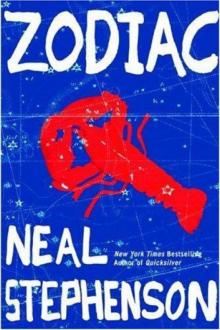 Zodiac: The Eco-Thriller
Zodiac: The Eco-Thriller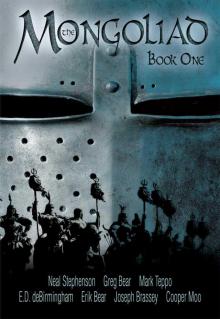 The Mongoliad: Book One
The Mongoliad: Book One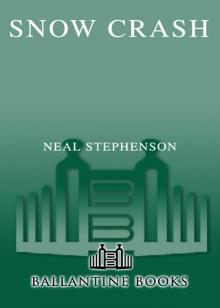 Snow Crash
Snow Crash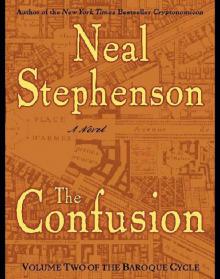 The Confusion: Volume Two of the Baroque Cycle
The Confusion: Volume Two of the Baroque Cycle The Rise and Fall of D.O.D.O.
The Rise and Fall of D.O.D.O.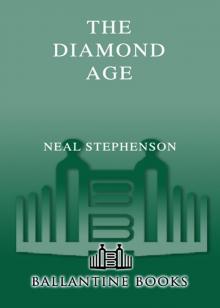 The Diamond Age: Or, a Young Lady's Illustrated Primer
The Diamond Age: Or, a Young Lady's Illustrated Primer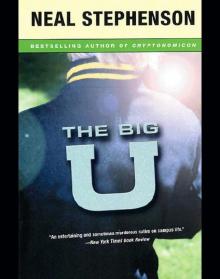 The Big U
The Big U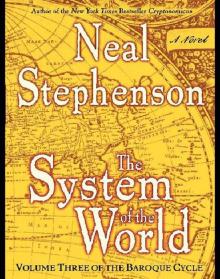 The System of the World: Volume Three of the Baroque Cycle
The System of the World: Volume Three of the Baroque Cycle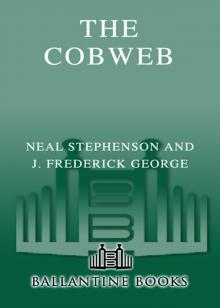 The Cobweb
The Cobweb Reamde
Reamde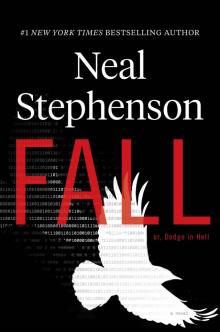 Fall; or, Dodge in Hell
Fall; or, Dodge in Hell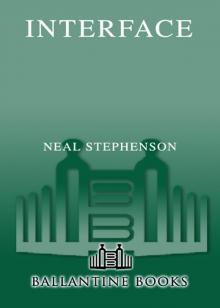 Interface
Interface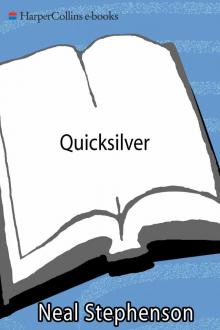 Quicksilver
Quicksilver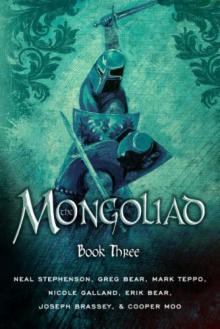 The Mongoliad: Book Three
The Mongoliad: Book Three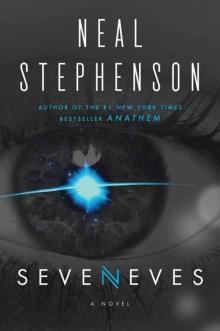 Seveneves
Seveneves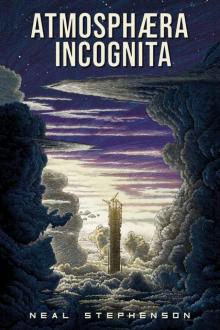 Atmosphæra Incognita
Atmosphæra Incognita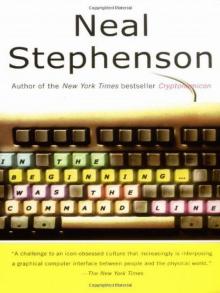 In the Beginning...Was the Command Line
In the Beginning...Was the Command Line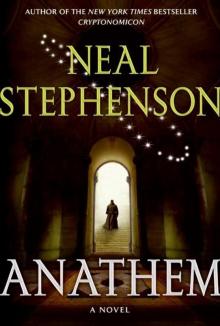 Anathem
Anathem The Rise and Fall of D.O.D.O.: A Novel
The Rise and Fall of D.O.D.O.: A Novel The Mongoliad: Book Two
The Mongoliad: Book Two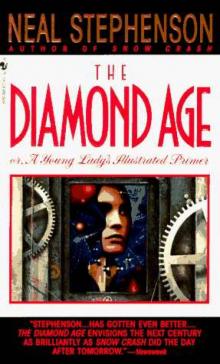 Diamond Age or a Young Lady's Illustrated Primer
Diamond Age or a Young Lady's Illustrated Primer THE System OF THE WORLD
THE System OF THE WORLD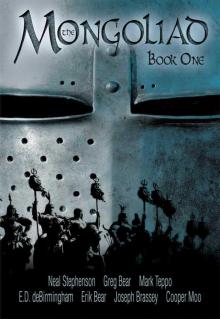 The Mongoliad: Book One tfs-1
The Mongoliad: Book One tfs-1 Some Remarks: Essays and Other Writing
Some Remarks: Essays and Other Writing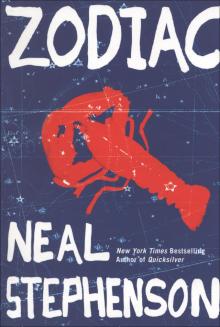 Zodiac
Zodiac Spew
Spew The Baroque Cycle: Quicksilver, the Confusion, and the System of the World
The Baroque Cycle: Quicksilver, the Confusion, and the System of the World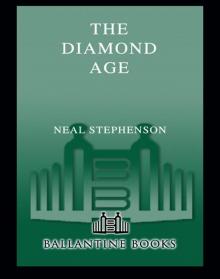 The Diamond Age
The Diamond Age Reamde: A Novel
Reamde: A Novel In the Kingdom of Mao Bell
In the Kingdom of Mao Bell Mother Earth Mother Board
Mother Earth Mother Board Twelve Tomorrows - Visionary stories of the near future inspired by today's technologies
Twelve Tomorrows - Visionary stories of the near future inspired by today's technologies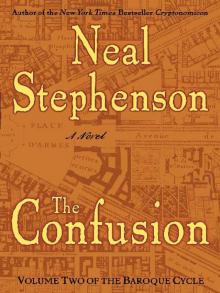 The Confusion
The Confusion The Great Simoleon Caper
The Great Simoleon Caper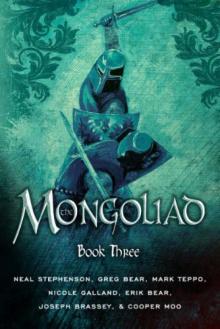 The Mongoliad: Book Three tfs-3
The Mongoliad: Book Three tfs-3